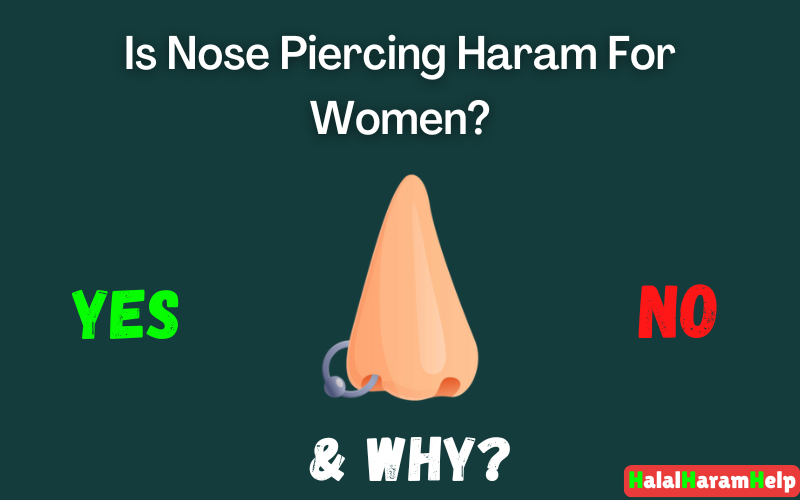Nose piercing is a common cultural and aesthetic practice among women in many parts of the world. But is it permissible in Islam?
The answer is straightforward, nose piercing is not haram for women in Islam, as long as it adheres to Islamic principles of modesty and does not involve sinful actions.
In this article, we will explore the Islamic viewpoint on nose piercing, its permissibility for women, its prohibition for men, and the guidelines to follow when getting a nose piercing according to Islamic teachings.

Is Nose Piercing Haram For Women?
For women, Islam does not explicitly prohibit nose piercing. In fact, it is seen as a form of adornment that aligns with the natural inclination toward beautification, provided it is done modestly and within the boundaries of Islamic teachings.
The act of beautification is permissible in Islam as long as it does not involve excessiveness, harm, or mimicry of un-Islamic practices.
Wearing jewelry, including nose rings, is also culturally significant in many Islamic societies, supporting its acceptability.
However, women must ensure the following when getting their noses pierced:
- Modesty is maintained: The jewelry should not be overly flashy or extravagant, as it could distract from the modesty of their appearance.
- Avoid harm: The piercing process should not involve excessive pain or health risks.
- Cultural alignment: The practice should not imitate non-Muslim or extreme cultural trends contradicting Islamic values.
You might also like to know is it haram to donate organs.
Why Is Nose Piercing Haram For Men?
For men, nose piercing is generally considered haram in Islam. This stems from the Islamic principle that men and women have distinct roles and appearances.
Nose piercing, historically and culturally, is associated with femininity and adornment, which men are discouraged from emulating.
In addition, men are prohibited from wearing gold jewelry in Islam, including gold nose rings.
Such adornments are seen as forms of extravagance and vanity, which go against the principles of simplicity and modesty expected of men in Islam.
Also see is it haram to donate blood.
What About Septum Piercing and Other Extreme Modifications?
Septum piercing and other extreme forms of body modification are discouraged in Islam for both men and women.
These practices often imitate non-Islamic cultures and may be perceived as excessive or harmful.
Additionally, the pain and potential health risks involved in such procedures make them less favorable from an Islamic standpoint.
How To Get A Nose Piercing Done In An Islamic Way?
If you are considering getting your nose pierced, here are some guidelines to ensure it aligns with Islamic principles:
- Choose modest jewelry: Avoid flashy, extravagant designs and opt for simple pieces that reflect modesty.
- Minimize harm: Ensure the piercing is done professionally and hygienically to avoid infections or complications.
- Follow cultural norms: The practice should align with your cultural traditions, as long as they do not contradict Islamic teachings.
- Hygiene is essential: Clean and sterilized tools should be used during the process, and proper aftercare must be observed to maintain cleanliness and health.
Why Is Nose Piercing Permissible For Women In Islam?
Islam encourages self-beautification within limits, and nose piercing for women is considered a form of adornment that enhances their natural beauty.
It is also a culturally significant practice in many Muslim-majority regions, making it acceptable as long as it does not contradict the principles of modesty and dignity.
This permissibility reflects Islam’s emphasis on balance, allowing women to express themselves through adornment without crossing into extravagance or imitating non-Islamic trends.
Also see is lucid dreaming haram.
FAQs
Q. Is nose piercing haram for women?
A: No, nose piercing is not haram for women as long as it follows Islamic guidelines on modesty and does not involve sinful practices.
Q. Is nose piercing allowed for men?
A: No, nose piercing is considered haram for men in Islam, as it is associated with femininity and goes against the principles of masculinity.
Q. Is septum piercing haram?
A: Yes, septum piercing is generally haram as it is seen as an extreme modification and often imitates non-Islamic cultural practices.
Q. Can I pierce any side of my nose?
A: Yes, there is no specific Islamic ruling on which side of the nose should be pierced. It is entirely a personal choice.
Conclusion
Nose piercing is a permissible practice for women in Islam, provided it aligns with the principles of modesty, avoids harm, and respects Islamic cultural values.
For men, however, it is considered haram as it goes against the guidelines of masculinity in Islam.
Ultimately, the permissibility of nose piercing depends on intention, modesty, and adherence to Islamic teachings.
As with any practice, Muslims are encouraged to act in a manner that reflects their faith and respects their cultural and religious values.


